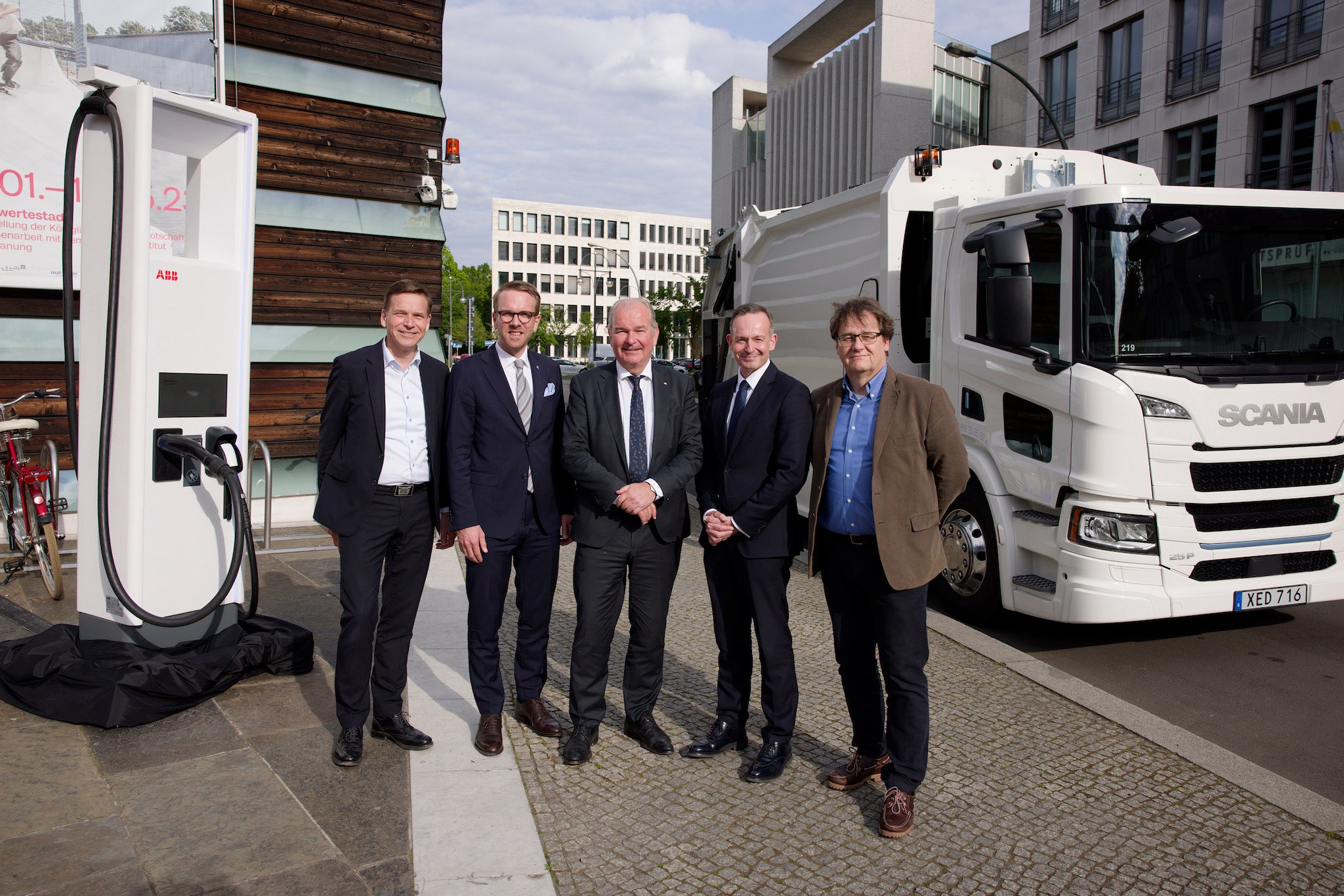
Against the backdrop of the Swedish EU Presidency and in the presence of German Transport Minister, Volker Wissing and the Swedish Transport Minister, Andreas Carlson, ABB E-mobility, TRATON, DHL Freight and Milence have jointly discussed the progress and challenges in the electrification of long-distance commercial vehicles at the Swedish Embassy in Berlin.
While the electrification for middle and last mile logistics is gaining greater traction, electric heavy-duty long-distance transport is still in its infancy. Megawatt charging represents an opportunity for more widespread adoption of sustainable transport solutions for long haul commercial vehicles.

Discover B2B Marketing That Performs
Combine business intelligence and editorial excellence to reach engaged professionals across 36 leading media platforms.
Michael Halbherr, interim CEO of ABB E-mobility said: “The electric truck market is still nascent but the technology is there and significant progress is already being made. Key industry stakeholders are working collaboratively to pave the way for a sustainable transport future for heavy duty vehicles. Firstly, by working on key technologies such as megawatt charging and digital charging management solutions, and secondly, by providing and optimizing solutions for the special requirements of long-distance transport like power density, greater grid capacity, microgrid integration and the demands of tough driving schedules.
“At ABB E-mobility, we are drawing on our experience in developing world leading EV charging solutions alongside key stakeholders across the sector to enable the needed progress, and continue to encourage support from policymakers across Europe.”
From a vehicle perspective Christian Levin, CEO TRATON adds: “The technology for the transition to sustainable transportation is ready — for trucks and buses and for charging stations. The TRATON GROUP brands have already proved that their battery electric vehicles are suitable for everyday use and can withstand even the harshest of conditions. Battery technology has advanced so much that a truck can now cover more than 1.5 million kilometers — in other words its entire lifespan — without needing to replace its battery. With the Megawatt Charging System (MCS), another crucial component of battery technology is also up and ready to go. We now need policymakers to act quickly and give us their widespread support so that we can build a high-performance European charging network at the required speed. This would then pave the way for the European Union to reach its climate goals.”
First successful charging session
The past twelve months show the huge steps leading companies and institutions of the industry, among these, ABB E-mobility and TRATON, have achieved with regards to MCS. Torgether, they have already developed a first draft of the MCS standard.
Only few days ago, together with Scania, a brand of TRATON, ABB E-mobility announced a pilot megawatt charging system had been successfully installed and tested in Sweden. Although the charging power is not yet in the megawatt range, the initial testing, to prove the technical feasibility of the system and connector, and allowing first software communication between charger and vehicle, is considered the next milestone in the development of an efficient, high power charging solution for heavy duty vehicles. With the progressive deployment of high-power chargers, with a final target current of 3000 A, the technology will enable half the charging time for heavy duty vehicles compared to charging solutions available today.
In addition to megawatt charging, the existing CCS standard will also play a key role. To ensure the seamless operation of electric fleets, in addition to charging solutions installed at depots, it is crucial to have sufficient charging points available along highways, where charging during breaks and overnight charging with lower power is possible. To achieve this, grid expansion, the supply of renewable energy and digital charging management solutions must be driven forward at pace.
Setting the electrification agenda
As the panelists at the Swedish Embassy discussed, expertise and innovation from industry stakeholders alone will not be enough. Instead, policymakers must set the course so that electromobility can work efficiently for long-distance transport.
More speed in planning and approval procedures, as well as harmonization of the respective requirements in building laws of the federal states are crucial for rapid ramp-up. The panelists also agreed that the industry needs clear signals from policymakers in order to build confidence among EU wide logistics companies and EU member states who have yet to embrace the benefits which e-mobility solutions for heavy duty trucking can deliver.
The Alternative Fuels Infrastructure Regulation (AFIR) is a good step in this direction as well as EU funded projects like ZEFES (Zero Emissions flexible vehicle platforms with modular powertrains serving the long-haul Freight Eco System), which brings together various players from industry and research, to test a variety of heavy-duty long-distance vehicle concepts.






